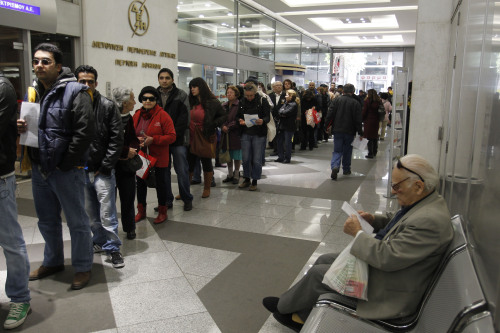ATHENS (AP) ― Greece’s largest trade union called Tuesday for a 24-hour general strike next week to protest austerity measures ― the first major walkout since the appointment of an interim coalition government earlier this month.
The GSEE union, which represents mainly private sector workers, called for the strike on Dec. 1 to protest the 2012 austerity budget due to be voted on in Parliament later that month. A similar announcement was expected from the country’s civil servants’ union. Greece’s last general strike, held in October, saw services across the country shut down for two days.
Greeks have held dozens of strikes and demonstrations over the past two years as their country has been gripped by a severe financial crisis that saw the government impose repeated rounds of salary cuts and tax hikes and left the country reliant on international rescue loans.
“The government has changed but the unjust and ineffective policy hasn’t changed at all,” GSEE head Yiannis Panagopoulos said in a statement. “For as long as this policy, which leaves social corpses in its wake, continues, we will stand firm against it ... and oppose it with any means.”
Workers at the capital’s subway, tram and electric rail network held a four-hour work stoppage Tuesday to protest measures that include the suspension on partial pay of about 30,000 civil servants. Separately, members of the electricity company’s workers’ union demonstrated outside the company’s bill-issuing building in continued protests over a new property tax that has been added to consumers’ power bills.
 |
Consumers of Public Power Company, DEH, wait in a line to pay the new emergency property tax in Athens on Tuesday. (AP-Yonhap News) |
Greece’s new government, appointed earlier this month after political turmoil led to the resignation of the Socialist prime minister and his replacement with a technocrat, is negotiating the details of a second bailout, worth 130 billion euros ($175 billion). It includes provisions for banks and other private holders of Greek bonds to write off 50 percent of their Greek debt holdings ― potentially cutting the country’s debt by 100 billion euros.
The country is also desperately in need of a vital 8 billion euros installment from its initial bailout agreed on in May 2010. Without it, Greece will default before Christmas and be unable to pay salaries and pensions.
European leaders have insisted they receive written commitments from the government and heads of the main parties in the coalition ― the majority socialists and the conservatives ― before they agree to release the funds. Conservative party leader Antonis Samaras has insisted his support for the interim government and the new debt deal should be enough.
Prime Minister Lucas Papademos, a former central banker and deputy head of the European Central Bank, was to head to Frankfurt later Tuesday to meet with European Central Bank head Mario Draghi, after talks with eurozone head Jean-Claude Juncker in Luxembourg.
Juncker said the disbursement of the next installment ― the sixth from the initial bailout ― would be discussed at the next meeting of eurozone finance ministers on Nov. 29, at which the ministers could decide to release the funds.
“We have expressed the view ... that (we) will be given a letter from the new Greek prime minister assuring us that all the commitments will be respected,” Juncker said.
He said eurozone officials want to be sure that Greece’s main political leaders back the government in its deal with international rescue creditors.
“I do think that from now to next Tuesday this will happen ... and that we will be able to take a decision on the sixth disbursement.”
European leaders began asking for written commitments amid anger over a sudden decision by Papademos’ predecessor, George Papandreou, to put Greece’s new debt deal to a referendum. Faced with a backlash both abroad and at home, where many of his own socialist lawmakers rebelled, Papandreou withdrew the plan and eventually stepped down after agreeing with Samaras on forming a unity government.
Samaras has long opposed many aspects of Greece’s austerity program, including that of taxation. He has advocated cutting taxes instead of increasing them, saying this would help stimulate growth to pull the country out of recession.
He accepted to cooperate with the socialists in a joint government, but has insisted its mandate run only to February before elections are held.
Juncker said there would be “a written commitment by the Greek government before the next meeting of the eurogroup.”
“It’s up to the Greece government and to the leaders of the different political parties inside Greece to give us the possibility to check if yes or no there is a cross party agreement in Greece,” he said.







![[Today’s K-pop] Blackpink’s Jennie, Lisa invited to Coachella as solo acts](http://res.heraldm.com/phpwas/restmb_idxmake.php?idx=644&simg=/content/image/2024/11/21/20241121050099_0.jpg)
